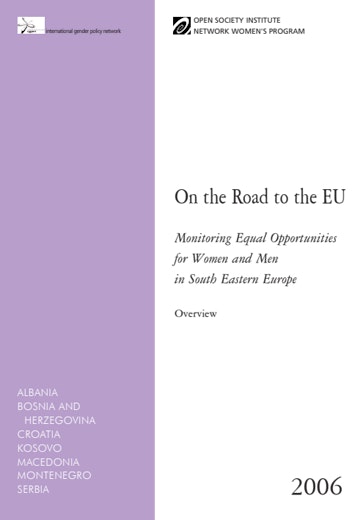Women in South Eastern Europe have yet to attain full gender equality and are at severe disadvantage compared to their counterparts in the EU, according to On the Road to the EU: Monitoring Equal Opportunities for Women and Men in South Eastern Europe, a report sponsored by the Open Society Network Women's Program. Published as some of the countries in South Eastern Europe are set to join the EU or begin accession negotiations, the report provides a much-needed assessment of how the region is complying with EU standards on gender equality.
Although many countries in South Eastern Europe have made progress over the past three years in bringing national laws on gender equality into line with the EU, much remains to be done. Among other findings, the report shows that more than half the women in the region are without jobs, with the highest rate of unemployment—70 percent—in Kosovo. In Croatia, which is expected to join the EU in 2010, the number of employed women has fallen by about 6.5 percent since 2000.
The statistics on gender pay gaps are equally troubling. On average, women in South Eastern Europe make 25 percent less than men, with the difference rising to 80 percent in Kosovo. Other affronts to women’s rights in the workplace persist. In Macedonia, for example, the law does not prevent employers from discriminating against pregnant women and mothers. And throughout much of South Eastern Europe, women who return from maternity leave have no guarantee in resuming their previous position.
Gender and age discrimination in advertisements remains widespread in Albania, Kosovo, Macedonia, and Montenegro. In Albania, for example, most advertisements for private-sector secretarial, assistant, or sales positions list a preference for women under 25, while those for managerial positions ask for men to apply.
A seven-part series, On the Road to the EU was prepared as part of the Open Society Network Women’s Program's “Bringing the EU Home” Project. This three-year project aims to promote awareness, advocacy, and enforcement of equal opportunity legislation at the national level and to build the capacity of national actors in civil society to use EU-level gender equality mechanisms effectively. The project further aims to help increase the importance of equal opportunities on the European agenda.
An assessment of the status of equal opportunities between women and men, de jure and de facto, was carried out in seven South Eastern European entities: Albania, Bosnia, Croatia, Kosovo, Macedonia, Montenegro, and Serbia. The reports were prepared in cooperation with the International Gender Policy Network.
A report overview is available for download.
Download
-
On the Road to the EU: Monitoring Equal Opportunities for Women and Men in South Eastern Europe (939.59 Kb pdf file)
Download the complete overview.
Read more
Voices In Depth
Ukraine’s Everyday Resistance

In the four years since Russia’s full-scale invasion, Ukrainians have sparked a civic reawakening. From frontline towns to major cities, ordinary people are defending democracy, caring for one another, and laying the groundwork for a post-war future.
Racial Discrimination
A Community Rallies Against Racial Discrimination in Denmark

When Denmark’s housing policies used racial discrimination to upend their community, local residents looked to the law to fight back. Now their six-year legal challenge is before the European Union’s top court in Luxembourg.
Evidence for Accountability
Q&A: How Open Source Evidence Is Challenging Abuses, Atrocities, and Disinformation

Bellingcat has pioneered the use of open-source research to expose human rights abuses, atrocity crimes, and high-level corruption and other criminal activities involving governments, gangs, and other illicit actors.
